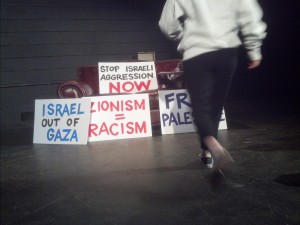[Because of the length of this review, this is the second of two parts: the first part, Eyeless in Gaza, provides an overview of the Wilbury Group production and the second part, Brainless in Gaza, provides some additional detailed historical analysis of the script.]

(Photo: Michael Bilow)
Another objection is that the central action of the play, Hannah’s impromptu trip to Gaza to help Hamas, is obviously implausible: Israel does not want, and would not allow, a random American college student to travel into a war zone, risking the bad publicity if she were to be killed or injured, or even worse turned into a hostage. In 2003, two years before Israel completely pulled out of Gaza in 2005, American college student Rachel Corrie traveled there to participate in anti-Israeli civil disobedience: one day she knelt down in front of an Army bulldozer with a blade seven feet high and was run over by the operator who said he could not see her; she sustained severe injuries and did not survive the ambulance ride to the hospital. The International Solidarity Movement (ISM) activists with her claimed that she was deliberately murdered because the bulldozer operator must have seen her, and they distributed photos to the press showing her standing clearly visible atop a large mound of dirt holding a megaphone – but soon the press discovered they had been lied to, that the photos had been taken hours earlier, and that she was neither standing nor holding a megaphone when run over. Even the openly leftist but well-respected Mother Jones concluded after sending a reporter to Gaza to interview witnesses that the bulldozer operator’s account was credible (“The Death of Rachel Corrie: Martyr, idiot, dedicated, deluded. Why did this American college student crushed by an Israeli bulldozer put her life on the line? And did it matter?”, Sep/Oct 2003). As to the misrepresented photos, Mother Jones wrote, “The episode probably did more to mute anger over Corrie’s death than anything else. The ISM activists were widely dismissed as frauds. In reality, they were probably just too young and inexperienced to know that if the media feels burned, it’ll turn on you, or worse, ignore you.” Following this, Israel barred foreign activists from coming into the country and deported nearly all who were already there.
Hannah becomes upset when she learns that her boyfriend’s father, a medical doctor at a Gaza hospital, has been arrested by the Israelis. Perhaps the fictional doctor worked at al-Shifa Hospital in Gaza City, under which the military and political headquarters of Hamas are located in an underground bunker. Described as “one of the worst-kept secrets” in Gaza, the Israelis know it’s there because they built it under the hospital in the 1980s to provide medical treatment, including operating rooms, in the event of war, but Hamas converted the space for military use in violation of international law, knowing that Israel would be unwilling to bomb a hospital. News media are given explicit written “suggestions” by Hamas as to what they may and may not report in order to make sure there is no evidence of this prohibited use of hospitals or other protected sites, which the Middle East Media Research Institute (MEMRI) has helpfully translated. Hamas has frequently been caught storing rockets and explosives in schools, mosques, and (in at least three cases) diplomatically protected UN facilities.
Is there a principled case to be made for Israel? The omission of context in the play is deliberately misleading to the audience. No attempt is made to explain the Israeli position that it initiated its actions in 2014 in response to the kidnapping and murder of three civilian teenagers, which Hamas first denied but then in the face of evidence admitted. That, in turn, led to Hamas and other paramilitary groups in Gaza firing rockets indiscriminately toward Israel in acts of terror, and Israel carried out a military operation inside Gaza to locate and destroy tunnels that had been excavated by Hamas with the specific purpose of smuggling armed terrorist teams into Israel to kidnap or murder civilians. Amnesty International issued a statement: “Palestinian armed groups displayed a flagrant disregard for the lives of civilians by repeatedly launching indiscriminate rockets and mortars towards civilian areas in Israel during the conflict in July and August 2014, said Amnesty International in a new report… ‘Unlawful and deadly: Rocket and mortar attacks by Palestinian armed groups during the 2014 Gaza/Israel conflict’ provides evidence that several attacks launched from inside the Gaza Strip amount to war crimes. Six civilians in Israel, including a four-year-old boy, were killed in such attacks during the 50-day conflict. In the deadliest incident believed to have been caused by a Palestinian attack, 11 children were among 13 Palestinian civilians killed when a projectile fired from within the Gaza Strip landed in the al-Shati refugee camp.” Even when Hamas rockets kill Palestinian children, they don’t care because they can falsely blame Israel and generate sympathetic publicity.
The distance from Gaza to Tel Aviv is about the same as the distance from Westerly to Providence. What would happen if Westerly were seized by an enemy military force that, over a period of years, repeatedly launched explosive rocket payloads targeted indiscriminately toward Providence?


